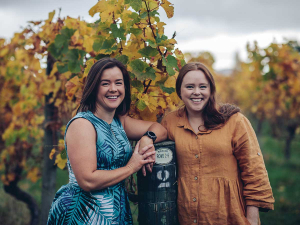Arabella Waghorn once felt awkward about joining the family business in Marlborough, suspecting people would consider her a “spoilt brat”.
But the past six years have taught her the rich quality of Astrolabe’s family fabric, with shared values, inherent trust, and extreme commitment woven into everything they do.
“We are really embracing that now,” she says.
“If I was a marketer working at another company, you’d go in and focus on the project and making a big impact really quickly. But you might not be thinking about the future,” says Astrolabe’s Brand Manager, who is also apprentice to her father Simon Waghorn, the winemaker who founded Astrolabe in 1996, along with her mother Jane.
Instead, Arabella and her sister Libby, who took over as General Manager last year, consider the long-term legacy of their parents’ company, from the next harvest, to the wines being aged, to the sustainability of the land and labels.
They’re less likely to “jump into new trends”, but also willing to present new ideas, because there’s a common understanding of the company’s DNA and how it will be impacted by business decisions.
“It makes it easy in a lot of ways,” says Arabella. “We can pick up where each other left off.”
And her fear that people might find a family business “tiresome or boring” has proven entirely unfounded, with customers and partners trusting the brand and product, because they know the people behind Astrolabe are fundamentally invested, she says.
Arabella, a designer, and Libby, a lawyer, are not trained in winemaking, and she notes that many of the new generation returning to Marlborough family wine companies are in the same boat.
They’ve grown up immersed in the wine industry (literally for Libby and Arabella, who plunged Pinot in their swimsuits as children) and know a great deal about the business of winegrowing.
But they’ve also picked up valuable skills through education and careers – often in a global setting – and are now bringing those learnings and connections back to the region, Arabella says.
“You get a really high level of skill that the wine industry might otherwise have struggled to attract.”
And the industry is increasingly attractive to that new generation, laden with skills and talent - “especially this year”, she says.
Beyond Covid-19, the sustainability and ethical initiatives of the New Zealand wine industry are making their mark, and “Marlborough is suddenly very appealing”














